Special Report
Best (and Worst) Paying Cities for Women

Published:
Last Updated:

Former Secretary of State Hillary Clinton has recently made history as the first female nominated for president of the United States. Her nomination brought some long-standing issues of gender equality to the political foreground. While progress has been made over the years, there is still a real and significant gender pay gap in the American workplace. The typical female worker earns less than 80% of the earnings of the typical male worker.
That gap is much worse in those industries that have historically excluded women. It is also much worse in certain parts of the country that, for a number of reasons, are still far further behind on the path to gender pay equality. Some places, such as Cape Coral, Florida have a smaller pay gap, and women there earn 93.6 cents for every dollar area men earn. In Provo-Orem, Utah women earn a median income of $33,504 a year, or just 64.3% of the male median wage. 24/7 Wall St. reviewed the 10 major metropolitan areas with the largest pay gap and the 10 metros with the smallest gap.
[in-text-ad]
A review of the data shows that even in areas where the pay gap is relatively smaller, this is not necessarily because they are better represented in higher-paying fields where they earn similar wages to men. Rather, in many of the metropolitan areas with the smallest pay gaps, men are either paid less — but still more than women — in traditionally high-paying jobs, or women are less represented in traditionally low-paying industries, notably the food services sector.
Click here to see the best cities for women
Click here to see the worst cities for women
In an interview with 24/7 Wall St., Julie Anderson, research associate at the Institute For Women’s Policy Research (IWPR), explained that this appears to be the case on a national level as well. “In a lot of places, men’s earnings dropped over time, and women’s earnings did not drop as much. So that closes the wage gap, but not really in the positive way we want.”
Another explanation for the lower gender pay gaps in certain metropolitan areas appears to be that both genders are paid less. It seems that often, when incomes are higher in an area, men tend to benefit significantly more. In places such as Cape Coral and Deltona, Florida and Fresno, California, both genders earn less than the median wage, and the total gender pay gap is less than $5,000.
On the other hand, in San Jose, California, where both women and men earn more than the typical pay for their genders nationwide, men earn nearly $20,000 more than women on average.
One common indicator of potential earnings is education, with higher education levels often leading to higher incomes. However, education does not appear to have made a difference in the gender pay gap. Women are more likely to have graduated from both high school and college, yet they have significantly less representation in the higher-paying industries for which a college education typically paves the way.
In many of the metro areas with the largest gender pay gaps, women occupy less than one in three management positions, less than one in five computer and mathematics jobs, and less than one in 10 architecture and engineering jobs.
Some argue that despite their education, women are simply not choosing to enter these fields. Anderson explained that there are a number of reasons women end up in certain lower-paying occupations.
For example, she noted that women are far more likely to assume responsibility for child-rearing in their family and that limits their choices. “People make pretty rational choices. If you’re in a family and a care-giving need arises, it’s sort of a self-perpetuating cycle that the lower earner is the one who steps out of the workplace, and as we know that is more likely to be a woman than a man. And then it is very hard to recover from that time out of the labor force.”
She added that women who continue to work are more likely to choose careers as educators because such work lines up with the children’s school schedules, or in health care occupations because those careers are more likely to yield shift work.
Even in those occupations where women tend to dominate employment, they are paid traditionally less than their male counterparts or less than similarly skilled positions in other industries.
Anderson added that whether the positions are traditionally female or male dominated, and even when controlling for a number of factors, the pay gap still exists. “There are plenty of studies that compare people within the same occupation, and you control for all kinds of factors — years of education, number of hours work, years at the company — there is always still some amount that is unexplained.”
To identify the worst and best paying metropolitan statistical areas for women, 24/7 Wall St. reviewed women’s median earnings as a percent of men’s median earnings in the 100 largest U.S. metropolitan areas. Median earnings by metro area and by sex came from the U.S. Census Bureau’s American Community Survey (ACS). A high percentage reflects a small gender pay gap, while a low percentage reflects a large pay discrepancy. We also considered median earnings for specific sectors, sub-sectors, and occupations, as well as median household income. We also reviewed data on the percentage of women and men in specific sectors. Educational attainment rates by gender also came from the American Community Survey.
These are the best (and worst) paying cities for women.
The Best Cities for Women
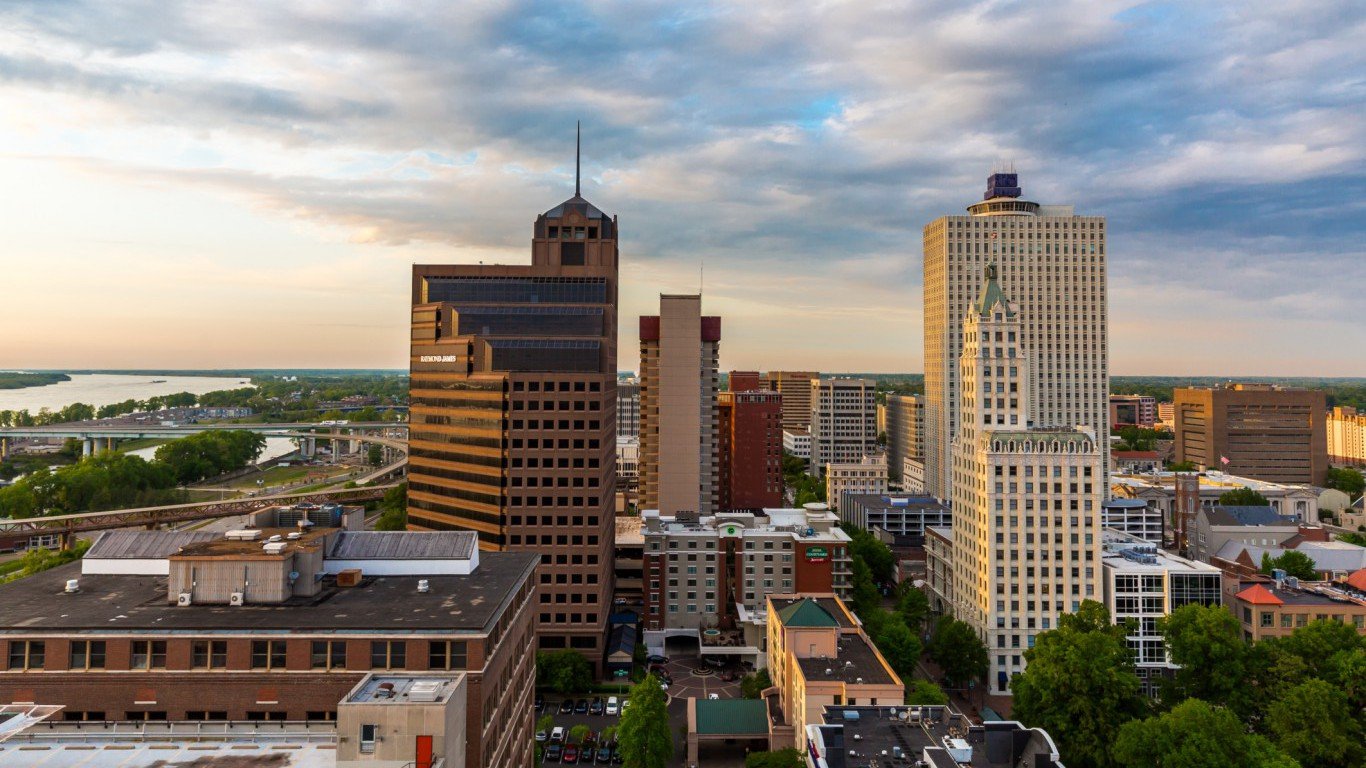
10. Memphis, TN-MS-AR
> Women’s pay as a pct. of men’s: 85.8%
> Median earnings for men: $42,314
> Median earnings for women: $36,317
In many parts of the country, it appears that the gender pay gap is smaller not because salaries for women are elevated to match their male counterparts, but because incomes are lower for both genders. In Memphis, women earn 86 cents for every dollar a man earns, which is the 10th smallest gap among large U.S. metro areas. The median earnings for women in the city of $36,317 a year is $2,700 below the U.S. median female earnings. Meanwhile, the median earnings for males in Memphis of $42,314 a year is $6,800 below the national male median earnings. Still, male earnings are about $6,000 more than female earnings in the city.
[in-text-ad]
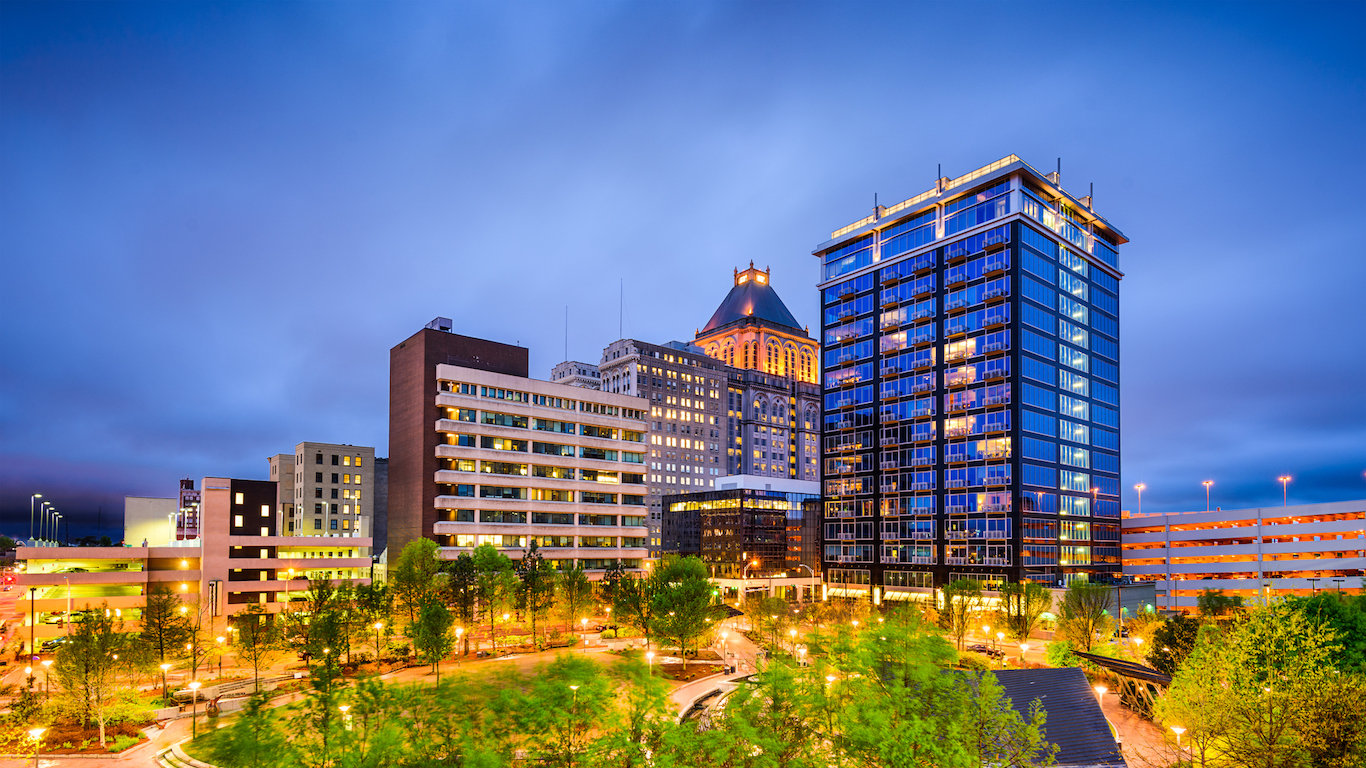
9. Greensboro-High Point, NC
> Women’s pay as a pct. of men’s: 85.9%
> Median earnings for men: $40,928
> Median earnings for women: $35,157
The gender pay gap in Greensboro, North Carolina is one of the lowest in the country, but the conditions for working women are still far from ideal. The glass ceiling — so called because it represents an unspoken, unofficial limit of advancement for women in certain roles — appears to be present also in Greensboro. In line with the national share, only 40% of management positions are filled by women, and the typical woman in management positions earn about $52,000 a year — roughly $24,000 less than the median male earnings in management positions.

8. New York-Newark-Jersey City, NY-NJ-PA
> Women’s pay as a pct. of men’s: 85.9%
> Median earnings for men: $57,280
> Median earnings for women: $49,230
The approximate 14 percentage point pay gap between men and women in the New York City metropolitan area is the eighth smallest gap of any major U.S. metropolitan area. In many metro areas with relatively small gender pay gaps, incomes tend to be lower overall. New York City is one exception to this rule. Men and women earn more than the typical American and more than the typical worker of their respective genders. Female workers in New York City earn a median of $49,230 a year, $10,000 higher than the typical female worker nationwide but roughly $8,000 less than the typical male New York worker. In October 2015, New York Gov. Andrew Cuomo signed several bills intended to strengthen workplace equality, collectively referred to as the Women’s Equality Agenda.

7. New Haven-Milford, CT
> Women’s pay as a pct. of men’s: 86.3%
> Median earnings for men: $57,173
> Median earnings for women: $49,348
Nationwide, women are slightly less likely to be employed than men, making up 47.5% of total U.S. employment. In New Haven, women have almost equal representation in the workforce, at 49.4% of total employment. Like nearby New York City, the earnings gap between men and women, while still a substantial 13.7 cents on the dollar, is less than the majority of major metro areas.
This smaller gap is not necessarily the result of more women working in higher-paying positions but rather to less women working in lower-paying ones. For example, while women make up 54.3% of all food preparation and service occupations nationwide, they account for 48.9% in New Haven.
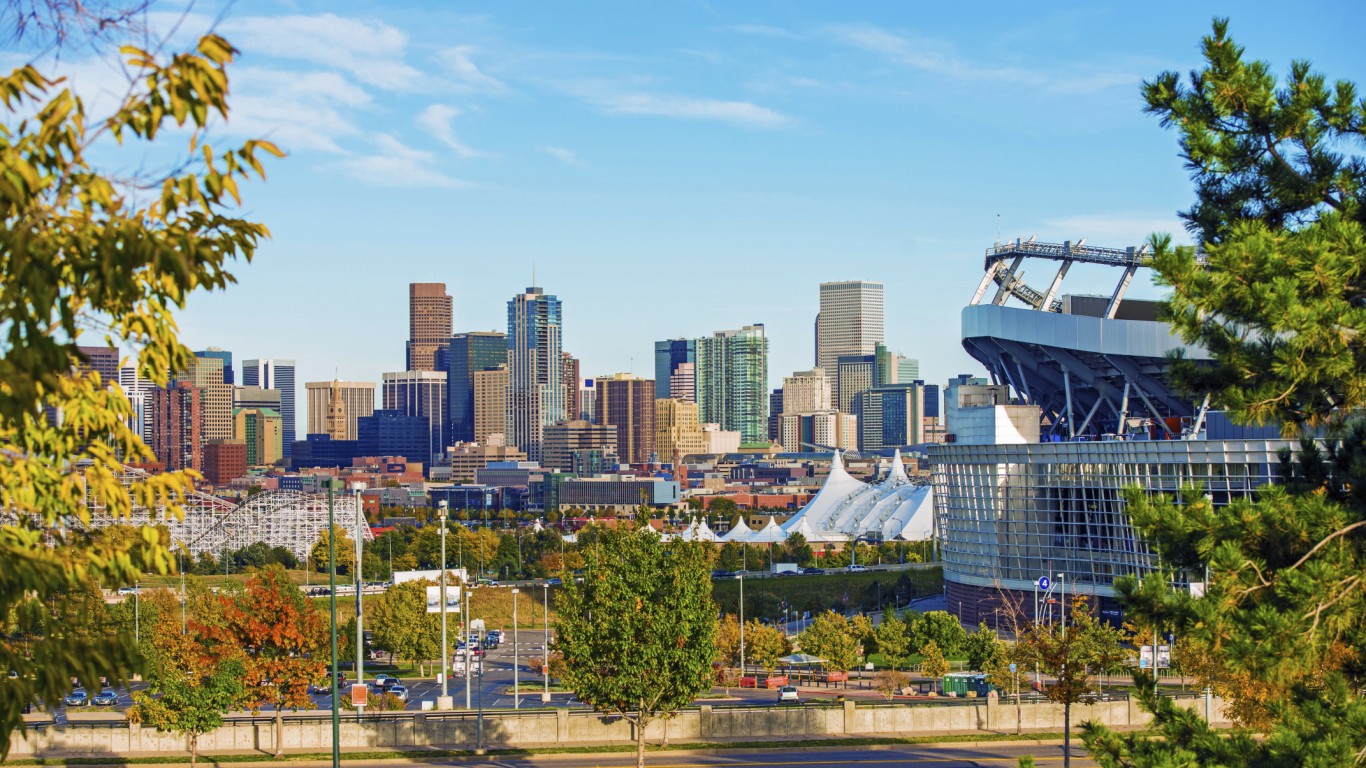
6. Denver-Aurora-Lakewood, CO
> Women’s pay as a pct. of men’s: 87.4%
> Median earnings for men: $52,089
> Median earnings for women: $45,543
Although the typical woman in Denver-Aurora-Lakewood earns just 87.4% of what the typical man earns, this is still one of the smaller pay gaps nationwide. Unlike many cities with relatively small gender pay gaps, the lower income inequality is not the result of low pay overall. The typical male in the city earns $52,089 a year, and the typical female $45,543 a year — each far higher than the median earnings for each gender nationwide.
Compared to their representation nationwide, women comprise a larger share of the workforce in nearly every lucrative field in Denver, which is likely one reason for the higher income. For example, 20.8% of all architects and engineers in the metro area are women compared to 15.4% nationwide. Similarly, 55.4% of all life, physical, and social scientists in Denver are women, more than the 46.3% national share.
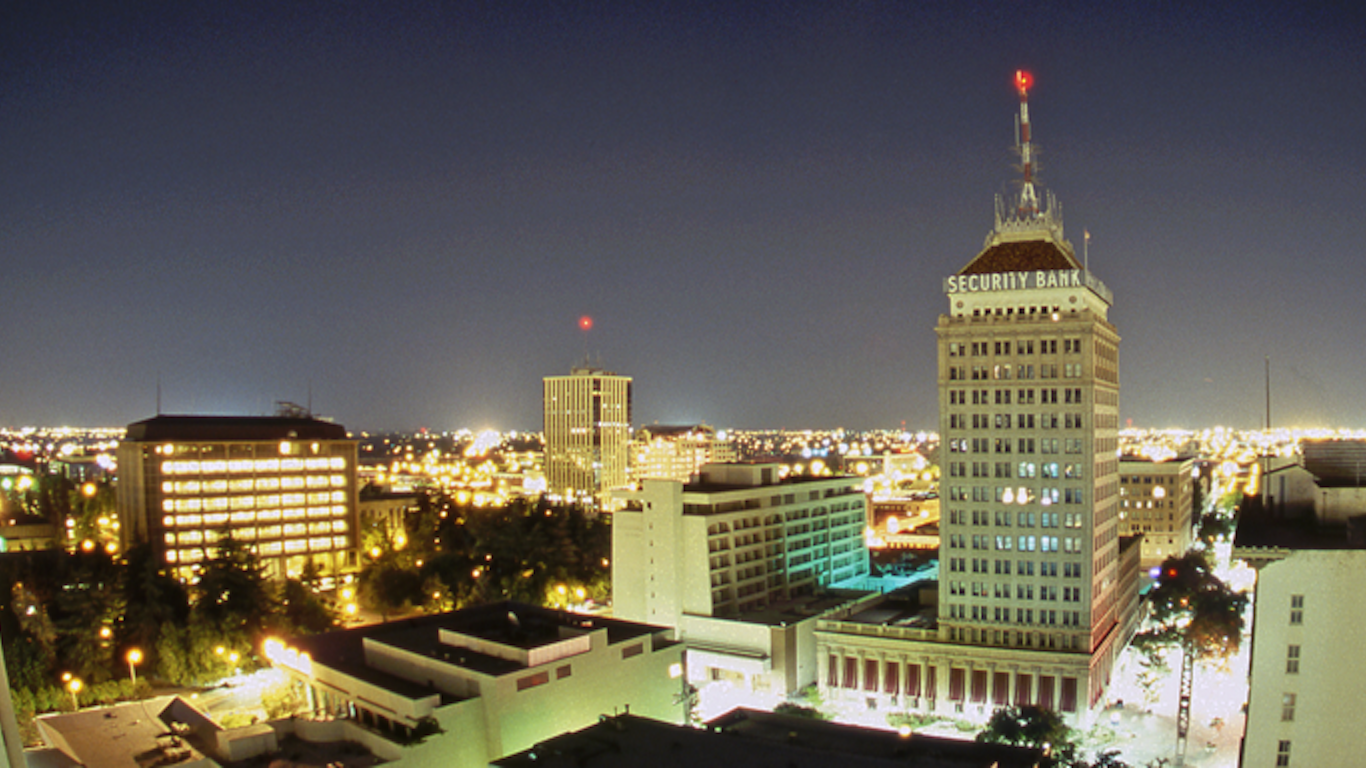
5. Fresno, CA
> Women’s pay as a pct. of men’s: 87.8%
> Median earnings for men: $40,626
> Median earnings for women: $35,674
Most high-paying industries either employ significantly more men than women or tend to pay men more. While this is the case in Fresno, California as well, gaps tend to be smaller in some key high-paying industries. Women make up 22% of Fresno’s architecture and engineering positions, which, while nowhere near equal representation, is the second highest female representation in the field of any major metro area. The typical female engineer or architect in the area is actually paid more than the typical male, with a median wage of $86,899 a year versus $73,921.
[in-text-ad]

4. Los Angeles-Long Beach-Anaheim, CA
> Women’s pay as a pct. of men’s: 89.9%
> Median earnings for men: $45,733
> Median earnings for women: $41,127
Women earn about 90 cents for every dollar men earn in Los Angeles-Long Beach-Anaheim, about 10 cents less on the dollar than the national pay gap. The typical woman working as a life, physical, or social scientist in Los Angeles earns as much as her male counterpart and more than women scientists nationwide. Women also earn as much as men in several low-paying positions in the metro area, such as community and social service occupations and office and administrative support jobs.
In recent years, celebrities have directed media attention to the gender pay gap among Hollywood actors. Women in the arts, design, entertainment, sports, and media occupations in Los Angeles earn 78% of what men in similar positions do, less than the 86% national gap.
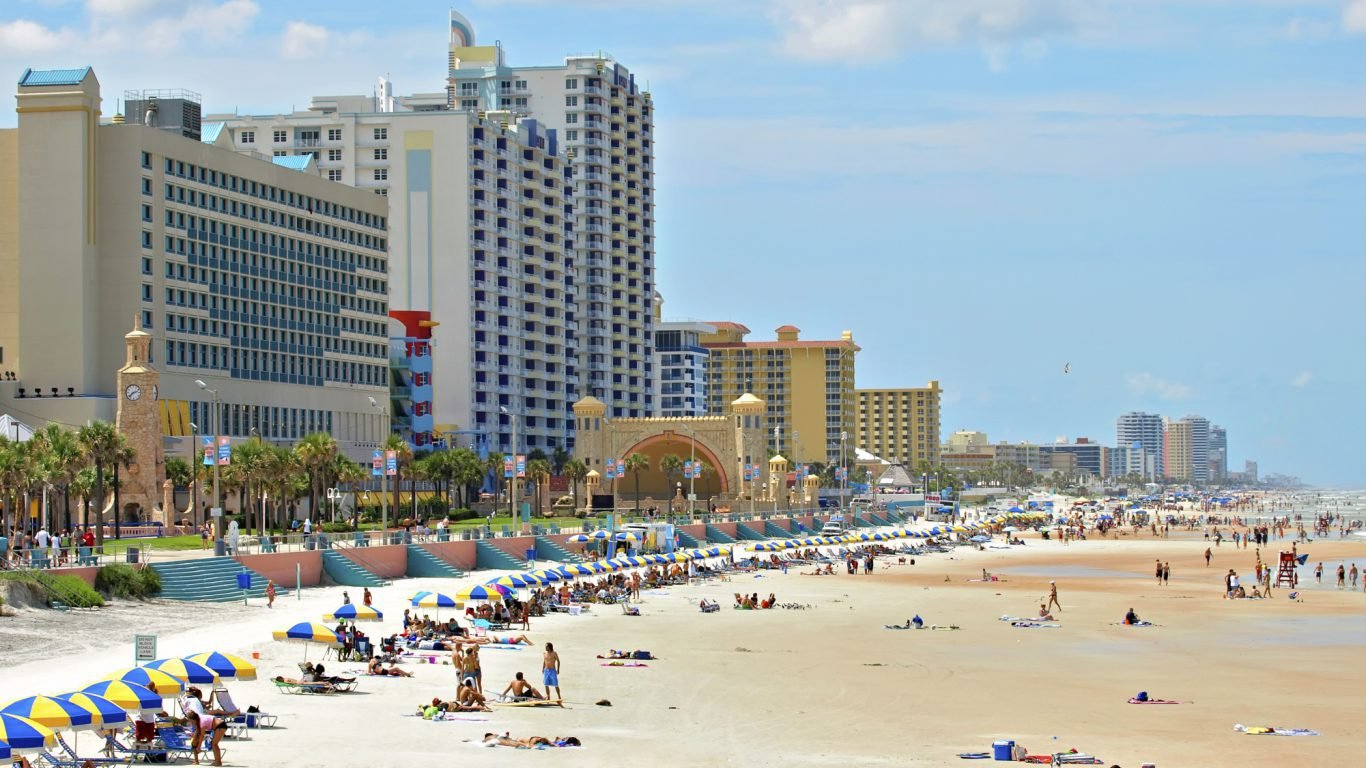
3. Deltona-Daytona Beach-Ormond Beach, FL
> Women’s pay as a pct. of men’s: 90.2%
> Median earnings for men: $35,989
> Median earnings for women: $32,458
Women working in Deltona, Florida earn more than 90 cents on the dollar compared to their male counterparts. However, depending on the type of occupation, there is still a sizeable gap between genders. In computer and mathematical occupations, women account for less than one-third of the workforce, and while the typical Deltona male employed in these industries earns more than $70,000 a year, women earn a median of just $38,750. As is the case in a number of metro areas, it is likely the pay gap in Deltona is less severe because women are less likely to be employed in some low-paying industries. While 54.3% of all food preparation and serving jobs are held by women nationwide, only 44.3% of deltona’s food service jobs are held by females, lower than in nearly every major metropolitan area.
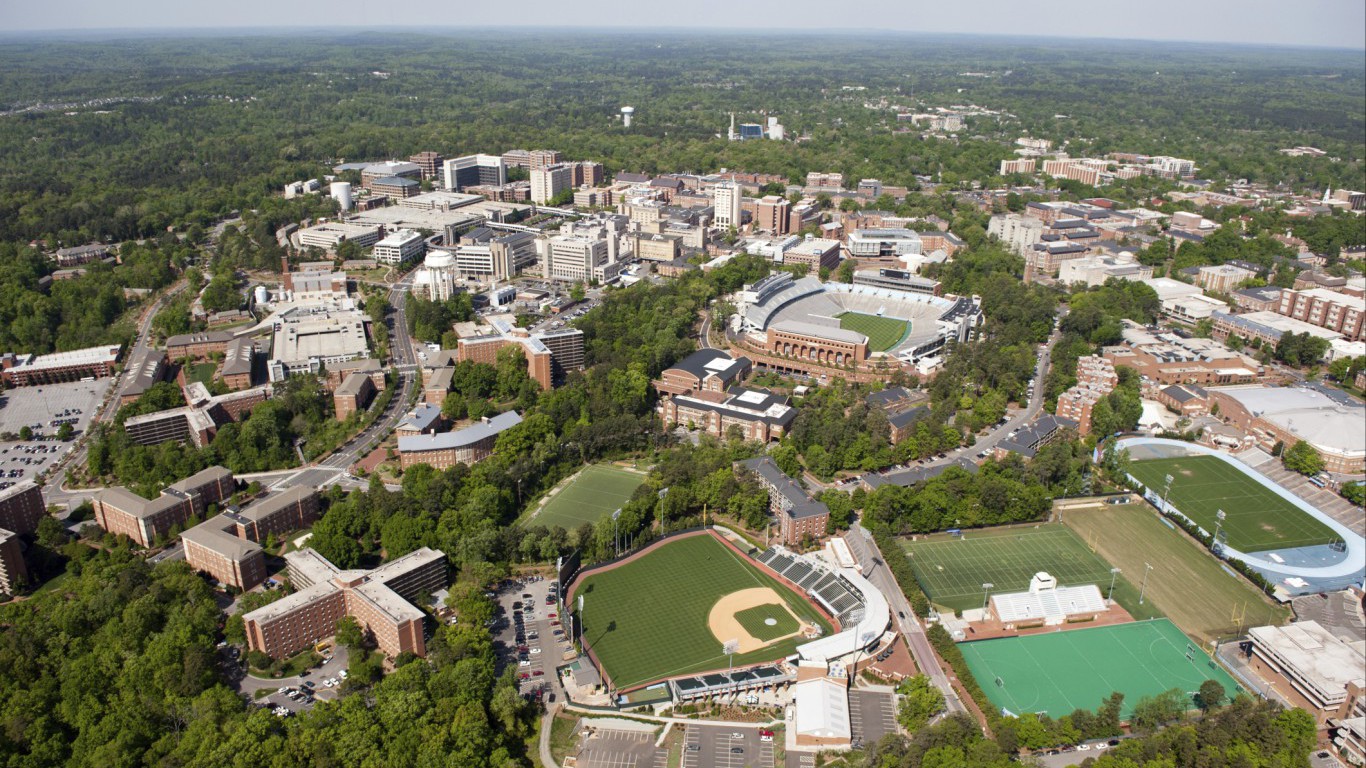
2. Durham-Chapel Hill, NC
> Women’s pay as a pct. of men’s: 91.7%
> Median earnings for men: $45,732
> Median earnings for women: $41,938
The typical woman in Durham-Chapel Hill earns $41,938 a year, roughly 92% of the $45,732 the typical man earns, one of the smallest gender pay gaps nationwide. Durham-Chapel Hill is home to the Research Triangle Park, the largest corporate research complex in the country. The more than 200 companies in the park may help increase access for women to high-paying technology jobs. Women comprise 19.7% of all architects and engineers in the metro area and earn roughly $7,000 more than their male counterparts, each some of the highest figures nationwide.

1. Cape Coral-Fort Myers, FL
> Women’s pay as a pct. of men’s: 93.6%
> Median earnings for men: $37,402
> Median earnings for women: $35,023
While the gender pay gap exists in every major metropolitan area, is it the least severe in Cape Coral, Florida. Women earn 93.6 cents for every dollar men earn, and in some area industries, women are paid as well or better than their male counterparts. The typical woman employed in the business and financial services sector in Cape Coral earns $51,296 a year, more than the $51,303 a typical man earns. While on a national level female health technologists and technicians earn just 82% of the median male earnings, the typical Cape Coral woman in the profession earns $5,100 more than the typical male earnings in the position.
The Worst Cities for Women
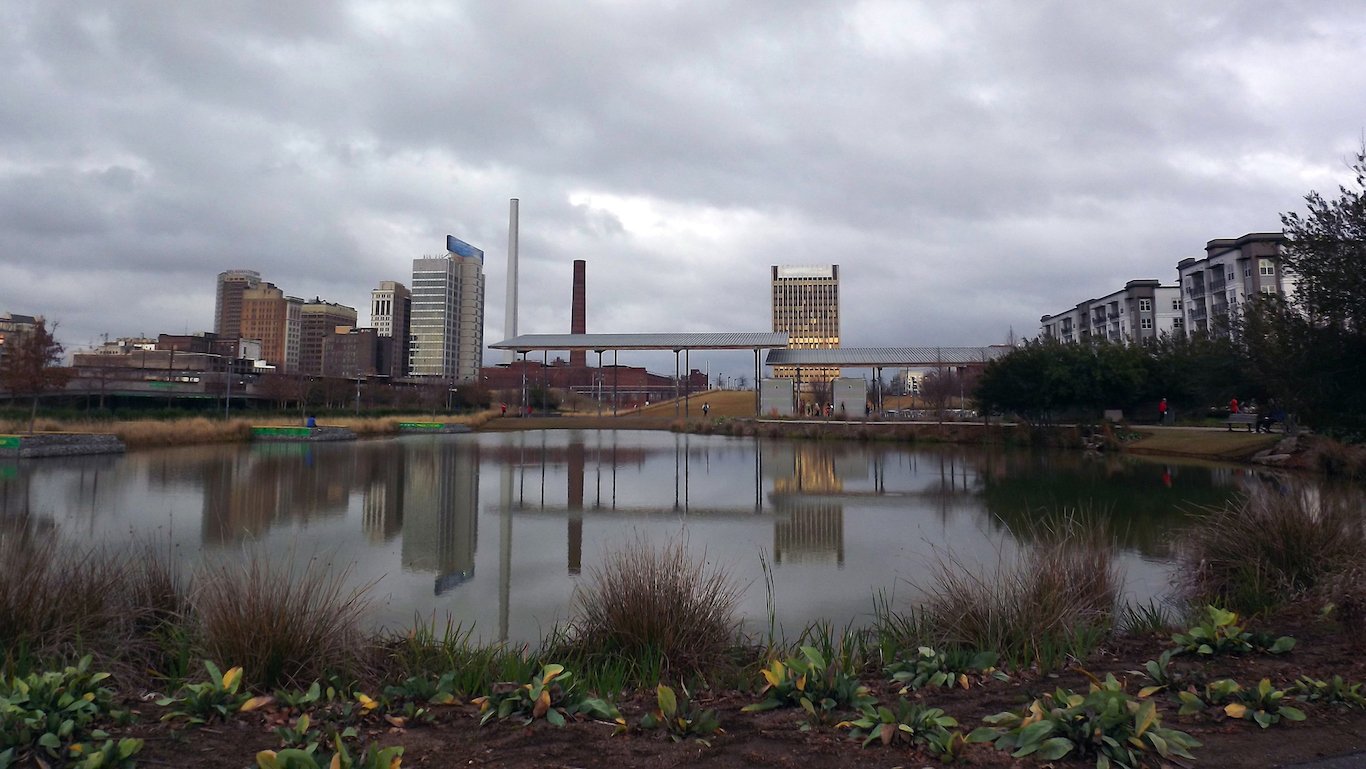
10. Birmingham-Hoover, AL
> Women’s pay as a pct. of men’s: 73.1%
> Median earnings for men: $49,030
> Median earnings for women: $35,818
The national gender pay gap of 79.5% is significant, but the gap is even worse in Birmingham, Alabama. The typical female worker earns just 73.1% of the typical male earnings, a difference of more than $13,000 a year. One commonly cited obstacle women face in the workplace is a general unavailability of management positions and lower pay for women in those positions. Women occupy just 37.7% of all management positions in Birmingham and earn a median pay of just $56,650 a year in those roles, much lower than the median earnings for male managers of $75,251 a year.
[in-text-ad]

9. Youngstown-Warren-Boardman, OH-PA
> Women’s pay as a pct. of men’s: 72.9%
> Median earnings for men: $44,757
> Median earnings for women: $32,612
Women in Youngstown-Warren-Boardman earn just 72.9% of men’s earnings in the metro area, one of the widest pay gaps nationwide. Women working in law in Youngstown face the largest income disparity. While the typical man working in a legal occupation in the metro area earns $105,714 annually, the median earnings for women in the field is just $31,700 a year. Women are also relatively underrepresented in the metro area’s more lucrative industries. Women occupy just 20.8% of all computer and mathematical positions and just 9.3% of all architecture and engineering positions, some of the smallest shares in the country.

8. Wichita, KS
> Women’s pay as a pct. of men’s: 72.9%
> Median earnings for men: $49,179
> Median earnings for women: $35,831
Wichita, Kansas women earn just 73 cents for every dollar earned by men in the city. Educational attainment is often an indicator of potential earnings with higher education leading to higher earnings. However, this does not appear to be the case in the Wichita metro area where women adults tend to be more highly educated than men adults. Despite their higher educational attainment, women are much less likely to have the higher-paying jobs a college education typically affords. Women occupy just 8.2% of architecture and engineering jobs in Wichita, 19.2% of computer and mathematical occupations, and 34.1% of management roles. In each category, women are also paid less than their male counterparts.

7. Augusta-Richmond County, GA-SC
> Women’s pay as a pct. of men’s: 72.6%
> Median earnings for men: $46,410
> Median earnings for women: $33,713
Women earn just about 73 cents for every dollar men earn in Augusta-Richmond County, one of the largest pay gaps in the country. While computer and mathematical jobs are some of the most lucrative nationwide, women in the field in Augusta earn $25,000 less than men and $20,000 less than their female counterparts nationwide. Similarly, women working in business and finance in Augusta earn just 58% of what men in the field earn, one of the largest pay gaps for the industry of any metro area. The median earnings for women across all occupations in Augusta-Richmond County is just $33,713 a year, less than the $39,054 median annual earnings for women nationwide.
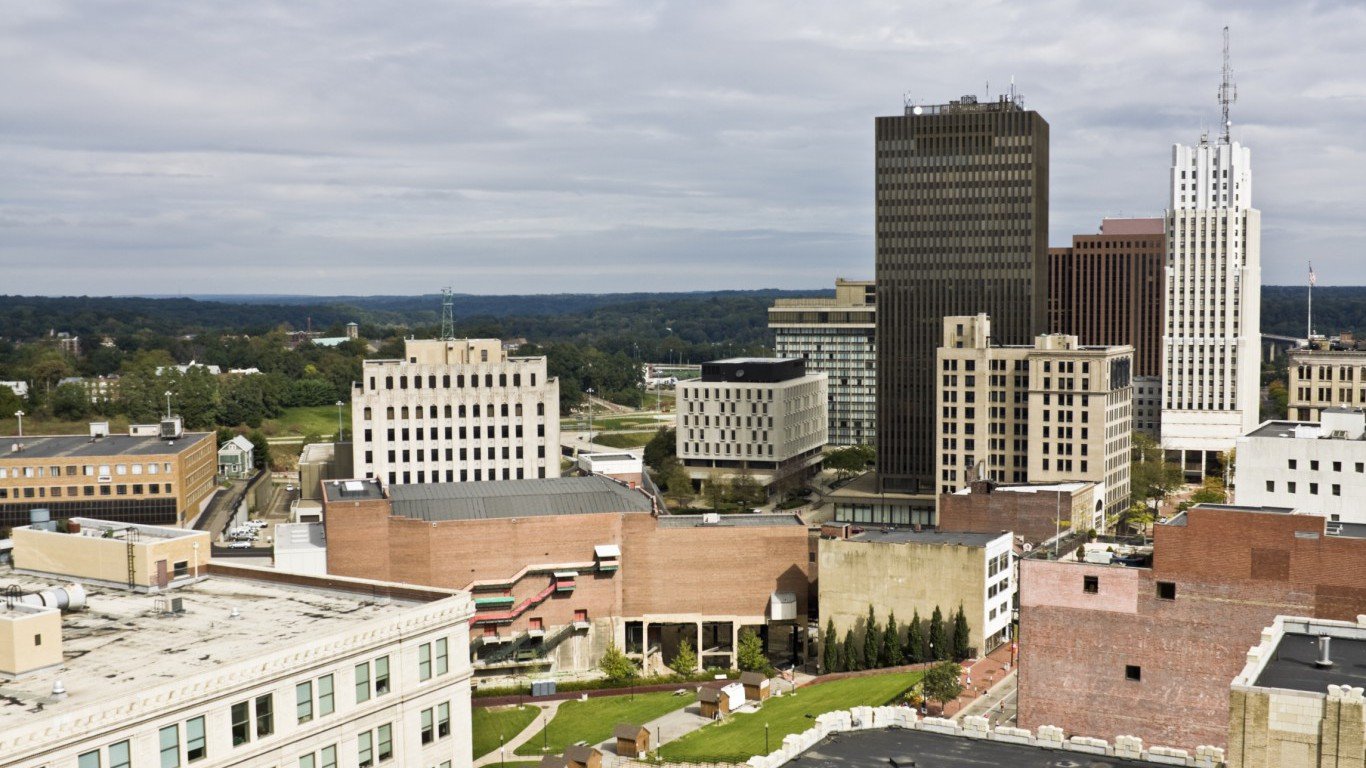
6. Akron, OH
> Women’s pay as a pct. of men’s: 71.3%
> Median earnings for men: $50,424
> Median earnings for women: $35,956
Women in Akron earn just 71.3% of what men earn, one of the widest pay gaps nationwide. Women are underrepresented in some of Akron’s highest-paying industries, which is likely one reason behind the income disparity. Women occupy 37.3% of all management positions, 10.7% of architecture and engineering positions, and 28.7% of all life, physical, and social science positions in the metro area, each among the smallest shares in the country.

5. Salt Lake City, UT
> Women’s pay as a pct. of men’s: 70.5%
> Median earnings for men: $50,217
> Median earnings for women: $35,414
Salt Lake City is one one of three Utah metro areas among the 10 worst cities for women. According to a 2015 study by advocacy group Voices for Utah Children, the state’s pay gap is due to a mix of discrimination and differences in qualification between the two sexes. While 34.0% of adult men in Salt Lake City have at least a bachelor’s degree, just 28.7% of women have similar educational attainment. The only major metro areas with larger gaps in educational attainment are Ogden-Clearfield and Provo-Orem — both also in Utah. The typical woman in Salt Lake City earns $35,414 annually, far less than the $50,217 median annual earnings for males in the metro area. The 70.5% pay gap is one of the widest in the country.
[in-text-ad]
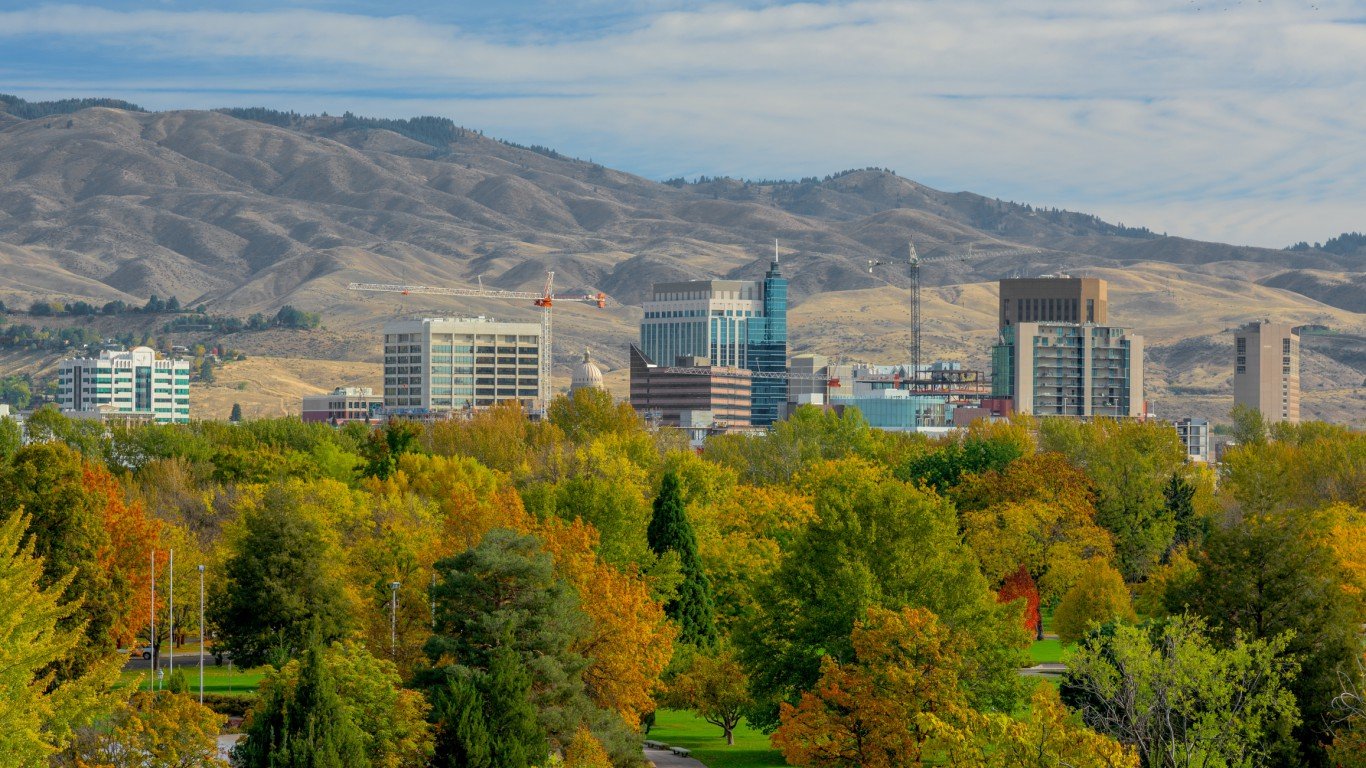
4. Boise City, ID
> Women’s pay as a pct. of men’s: 69.7%
> Median earnings for men: $46,046
> Median earnings for women: $32,110
Women tend to be paid less in industries where they are less represented. However, they are also underpaid in industries where they make up the vast majority of jobs. In Boise, which has one of the largest gender pay gaps in the country, women account for at least 65% of education and health diagnosing and practitioner roles but are paid just 65% of their male counterparts. The median earnings for female technologists is just $35,933 a year compared to $61,083 for males.
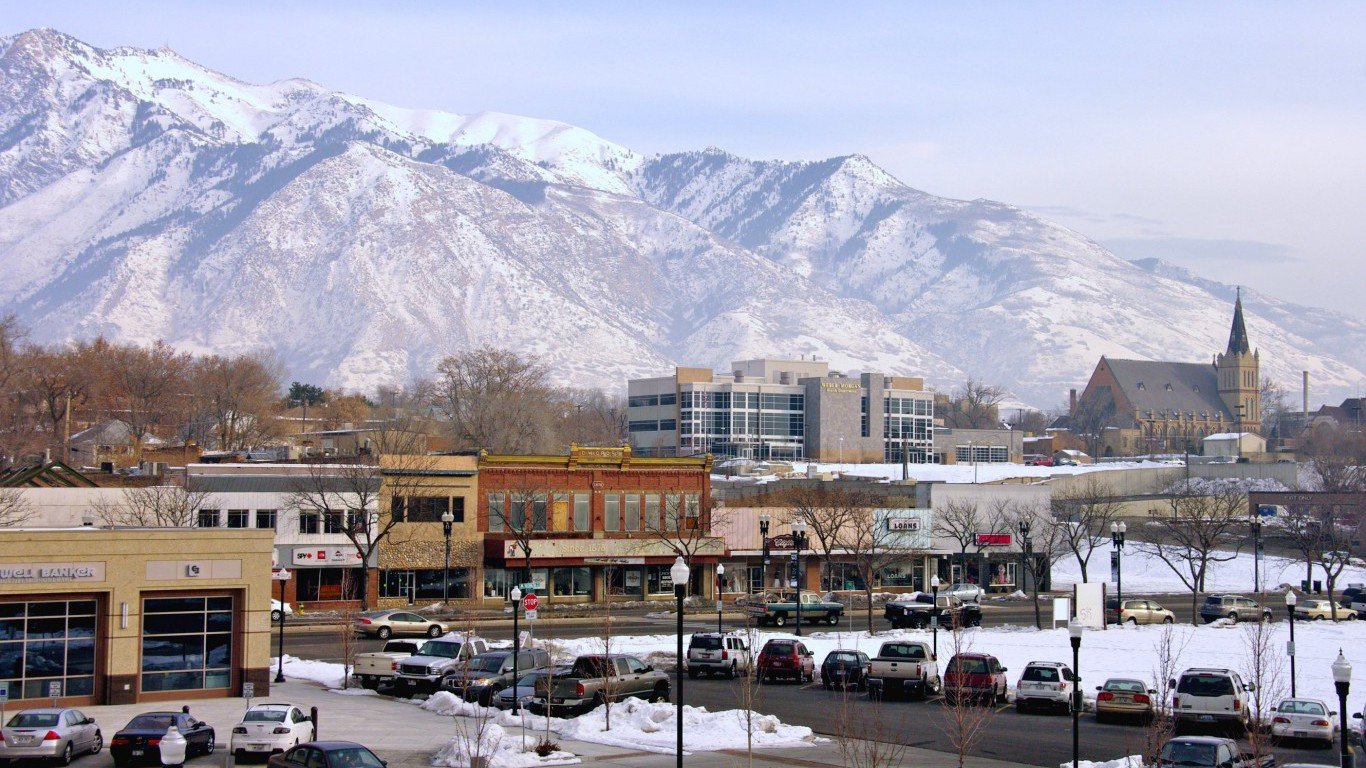
3. Ogden-Clearfield, UT
> Women’s pay as a pct. of men’s: 67.5%
> Median earnings for men: $53,158
> Median earnings for women: $35,879
With median earnings of $46,940 a year, Ogden-Clearfield residents earn more than Americans nationwide. The distribution of these high incomes, however, is close to the worst in the country.
Very few women nationwide work in construction and extraction occupations, occupying just 2.8% of such jobs. Women in Ogden, however, make up 4.6% of such workers. Despite the higher representation, female industry workers in the metro area earn just $18,649 annually, considerably lower than the median earnings for women working in these jobs nationwide and less than 40% of what men in similar jobs earn in the area. By contrast, the pay gap for the industry nationally is more than 80%.

2. Baton Rouge, LA
> Women’s pay as a pct. of men’s: 64.9%
> Median earnings for men: $53,155
> Median earnings for women: $34,522
Baton Rouge trails only Provo-Orem as the worst paying city for women. The two cities share the distinction as the only metros in the nation where women are paid less than two dollars for every three dollars a man is paid. Like the nation as a whole, pay is the least equitable in Baton Rouge’s legal occupations. Women, who account for 43.5% of people employed in the industry, earn $52,459 annually, far less than the median earnings for men working in the sector. Female wages are lower than male earnings in nearly every area industry despite the fact that area adult women tend to be better educated than the men.

1. Provo-Orem, UT
> Women’s pay as a pct. of men’s: 64.3%
> Median earnings for men: $52,068
> Median earnings for women: $33,504
No city has a wider gender pay gap than Provo-Orem, where median earnings for women are equal to just 64.3% of male earnings. As is generally the case, the pay gap is even wider in some industries. Women working in health care support occupations in the area earn less than half of what men working in the industry typically earn — the widest gap of all area industries. While the gender pay gap tends to persist even when adjusting for educational attainment, the large income gap in the Provo area is likely due in part to disparate college attainment rate between men and women. Unlike most metro areas, men are more likely than women to have pursued higher education, with 41.0% of men and 33.2% of women having attained at least a bachelor’s degree.
A financial advisor can help you understand the advantages and disadvantages of investment properties. Finding a qualified financial advisor doesn’t have to be hard. SmartAsset’s free tool matches you with up to three financial advisors who serve your area, and you can interview your advisor matches at no cost to decide which one is right for you. If you’re ready to find an advisor who can help you achieve your financial goals, get started now.
Investing in real estate can diversify your portfolio. But expanding your horizons may add additional costs. If you’re an investor looking to minimize expenses, consider checking out online brokerages. They often offer low investment fees, helping you maximize your profit.
Thank you for reading! Have some feedback for us?
Contact the 24/7 Wall St. editorial team.